WHAT IS FROZEN SHOULDER ?
– Frozen shoulder also called adhesive capsulitis.
– It’s a painful condition in which the movement of the shoulder becomes limited .
– Frozen shoulder occurs when the strong connective tissue surrounding the shoulder joint, called the shoulder joint capsule become thick, stiff, and inflamed.
– The joint capsule contains the ligaments that attach the top of the humeral head to the shoulder socket firmly holding the joint in place.
– frozen shoulder may take two to nine months to develop. Although the pain may slowly improve, stiffness continues, and range of motion remains limited.
WHAT ARE THE FACTORS THAT INCREASE THE CHANCES OF FROZEN SHOULDER ?
– Gender: More common in women than men.
– Age: Adults, most commonly between 40 and 60 years old.
–Recent shoulder injury: Any shoulder injury or surgery that results in the keep the shoulder from moving arm.
– Certain medical conditions can increase your risk too. You may also be more likely to get frozen shoulder if you have diabetes. About 10% to 20% of people with diabetes get frozen shoulder.
-People who have certain diseases appear more likely to develop frozen shoulder. Diseases that might increase risk include:
- Diabetes
- Hyperthyroidism
- Hypothyroidism
- Cardiovascular disease
- Tuberculosis
- Parkinson’s disease
HOW FROZEN SHOULDER TAKES PLACE
- The process usually begins with an injury or inflammation of the soft tissues, typically due to overuse injuries such as bursitis or tendinitis of the rotator cuff. Inflammation causes pain that is worse with movement and limits the shoulder’s range of motion.
- When the shoulder becomes immobilized in this way, the connective tissue surrounding the joint — the joint capsule — thickens and contracts, losing its normal capacity to stretch. Trying to avoid the pain caused by moving the shoulder leads to further contraction of the capsule.
- The humerus has less space to move in, and the joint may lose its lubricating synovial fluid. In advanced cases, bands of scar tissue form between the joint capsule and the head of the humerus.
SYMPTOMS
– The main symptoms of a frozen shoulder are pain and stiffness that make it difficult or impossible to move it.
– If you have frozen shoulder, you’ll likely feel a dull or achy pain in one shoulder. You might also feel the pain in the shoulder muscles that wrap around the top of your arm.
-You might feel the same sensation in your upper arm. Your pain could get worse at night, which can make it hard to sleep.
There are mainly three stages of frozen shoulder.
- Freezing stage:
- You develop a pain (sometimes severe) in your shoulder any time you move it.
- It slowly gets worse over time and may hurt more at night.
- You’re limited in how far you can move your shoulder.
- Frozen stage:
- Your pain might get better but your stiffness gets worse.
- Moving your shoulder becomes more difficult and it becomes harder to get through daily activities. This stage can last 4-12 months.
- Thawing stage:
- Your range of motion starts to go back to normal. This can take anywhere from 6 months to 2 years.
· DIAGNOSIS
- To diagnose frozen shoulder, your doctor will give you a physical exam. They’ll check it to see how badly it hurts and how far it moves.
- During the “active” part of the exam, they’ll let you move your shoulder on your own. During the “passive” portion, they’ll move it for you, and note the differences.
- A physical exam is usually enough to diagnose frozen shoulder, but your doctor may also order imaging tests such as X-rays, ultrasound, or MRIto rule out other problems like arthritis or a torn rotator cuff that can also cause pain and limit how far it moves.
MANAGEMENT
1. Nerve stimulation: A transcutaneous electrical nerve stimulation (TENS) unit delivers a tiny electrical current to key points on a path that a nerve follows. The current, delivered through electrodes taped to the skin, isn’t painful or harmful. It might cause the release of molecules that curb pain (endorphins) or block fibers that carry pain.
2. Exercise:
1. Pendulum stretch :
– first. Relax your shoulders. Stand and lean over slightly, allowing the affected arm to hang down. Swing the arm in a small circle about a foot in diameter.
– Perform 10 revolutions in each direction, once a day. As your symptoms improve, increase the diameter of your swing, but never force it.
– When you’re ready for more, increase the stretch by holding a light weight (three to five pounds) in the swinging arm.

2. Towel stretch :
-Hold one end of a three-foot-long towel behind your back and grab the opposite end with your other hand. Hold the towel in a horizontal position.
– Use your good arm to pull the affected arm upward to stretch it. You can also do an advanced version of this exercise with the towel draped over your good shoulder.
– Hold the bottom of the towel with the affected arm and pull it toward the lower back with the unaffected arm. Do this 10 to 20 times a day.
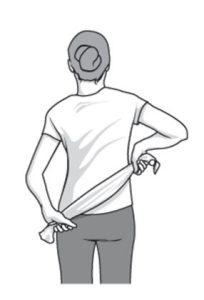
3. Finger walk :
-Face a wall three-quarters of an arm’s length away. Reach out and touch the wall at waist level with the fingertips of the affected arm.
– With your elbow slightly bent, slowly walk your fingers up the wall, spider-like, until you’ve raised your arm as far as you comfortably can.
– Your fingers should be doing the work, not your shoulder muscles. Slowly lower the arm and repeat. Perform this exercise 10 to 20 times a day.
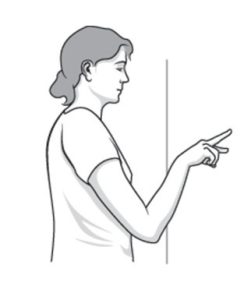
4. Cross body stretch:
-Use your good arm to lift your affected arm at the elbow, and bring it up and across your body, exerting gentle pressure to stretch the shoulder. Hold the stretch for 15 to 20 seconds. Do this 10 to 20 times per day.
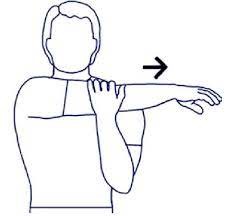
5. Arm pit stretch:
– Using your good arm, lift the affected arm onto a shelf about breast-high. Gently bend your knees, opening up the armpit.
– Deepen your knee bend slightly, gently stretching the armpit, and then straighten. With each knee bend, stretch a little further, but don’t force it. Do this 10 to 20 times.
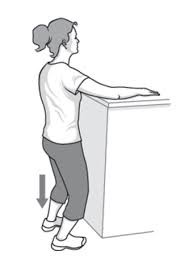
6. Outward rotation:
– Hold a rubber exercise band between your hands with your elbows at a 90-degree angle close to your sides. Rotate the lower part of the affected arm outward two or three inches and hold for five seconds. Repeat 10 to 15 times, once a day.

7. Inward rotation:
– Stand next to a closed door, and hook one end of a rubber exercise band around the doorknob. Hold the other end with the hand of the affected arm, holding your elbow at a 90-degree angle. Pull the band toward your body two or three inches and hold for five seconds. Repeat 10 to 15 times, once a day.
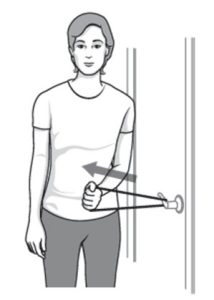
HOMEOPATHIC MANAGEMENT
- Homeopathic medicines for frozen shoulder can relieve pain and also improve the range of movement of the shoulder joint. And improve quality of life, relieves pain and stiffness, reduces limitation and disability in activities of daily life of the sufferer.
- Homeopathy relieves the inflammation of the shoulder joint. This provides relief to all attendant symptoms of frozen shoulder.
1. Ledum pal:
– It contains sesquiterpenes, flavonoids, polyphenols, so these all have their significant role in the reduction of uric acid from the joints.
– There is a sense of pressure in the affected shoulder joint. This feeling worsens by movement.
– The shoulder is swollen, hot and pale.
– One feels throbbing pain in the shoulder joint. The pains are worse in the warmth of bed and cold applications relieve the pains.
– Aggravation of pain on raising the arm.
2. Rhus Tox :
- Rhus tox acts as Anti-inflammatory medicine and relieves the inflammation of the joint.
- There is stiffness of the shoulder joint. Moving for a while relieves the pain. There may be numbness and formication which increases after any exertion.
- The affected shoulder joint and the arm feel weak and powerless.
- The pains tend to be worse at night and after rest.
- The pain may have started after lifting or any exertion of the arm
- pain better by movement.
3. Ferrum Met
- It is one of the best homeopathic medicines for frozen shoulder or any sort of rheumatic pain in the shoulder.
- It is best for young patients who are otherwise physically weak.
- The patient is usually anaemic and tends to flush easily.
- There is coldness of the limbs, hands and feet.
- Cracks in joints.
- Sudden cramps or tearing pain in limbs
- The patient and his body are sensitive to any sort of exertion.
- The skin is pale and often there is flushing of the skin. The muscles are flabby and relaxed.
- Pain increased by putting the arm behind him.
4. Kalmia latifolia :
–Active ingredient of kalmia- named arbutin possess ability to reduce inflammation by lowering levels of Tumor Necrosis Factor-a and Interleukin-6.
– Arbutin reduces oxidative stress induced inflammation and reduces cell adhesion ability and the production of adhesion molecules around the joint.
–If you have pain that begins in the upper joint (particularly the hip or shoulder) and moves down indicates that you need this remedy.
-Right shoulder bursitis is widespread and spreads to the elbow, wrist, or side. –Pain and inflammation can come on all of a sudden, sometimes shifting. Discomfort is worse from motion, worse at night, and of a neuralgic kind.
WHY COSMIC HOMEO HEALING CENTRE?
At cosmic homeo healing centre, under the guidance of senior homeopath Dr. Mahavrat Patel, our team of experts have helped thousands of cases of frozen shoulder with homeopathic medicine for permanent and long lasting relief.


